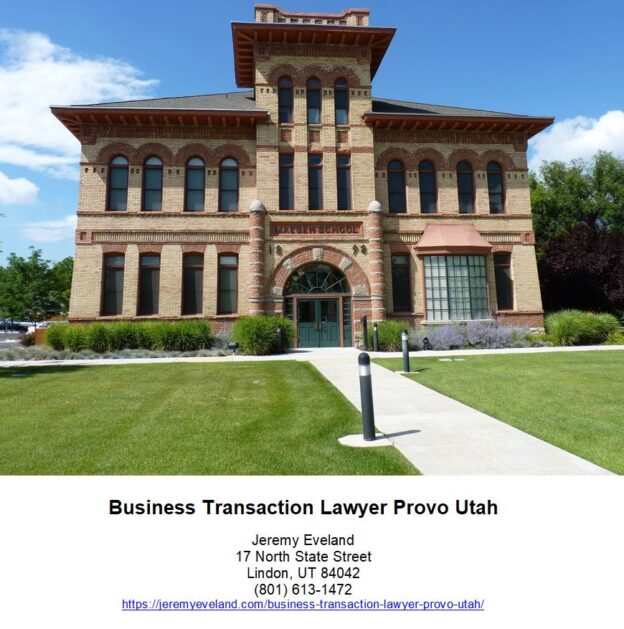Utah Estate Planning
-
Utah Lawyer
- Introduction
- The Benefits of Working with an Experienced Utah Estate Planning Attorney
- Understanding Utah’s Estate Tax Laws
- How to Create an Effective Estate Plan in Utah
- The Importance of Updating Your Estate Plan in Utah
- Exploring the Different Types of Trusts Available in Utah Estate Planning
- Q&A
“Secure Your Future with Utah Estate Planning”
Introduction
Utah Estate Planning is a process of preparing for the transfer of your assets and property after you pass away. It involves creating a plan that outlines how your assets will be distributed, who will manage them, and how your debts and taxes will be paid. Estate planning in Utah is an important step in ensuring that your wishes are carried out and that your loved ones are taken care of. It can also help you avoid probate court and minimize taxes. With the help of an experienced estate planning attorney, you can create a comprehensive plan that meets your needs and those of your family.
The Benefits of Working with an Experienced Utah Estate Planning Attorney
When it comes to estate planning, it is important to work with an experienced Utah estate planning attorney. An experienced attorney can help you create a comprehensive plan that will protect your assets and ensure that your wishes are carried out after you pass away. Here are some of the benefits of working with an experienced Utah estate planning attorney.
1. Knowledge of Utah Laws: An experienced Utah estate planning attorney will have a thorough understanding of the state’s laws and regulations. This knowledge will help ensure that your estate plan is in compliance with all applicable laws and regulations.
2. Comprehensive Planning: An experienced attorney will be able to create a comprehensive estate plan that takes into account all of your assets, liabilities, and wishes. This plan will ensure that your wishes are carried out after you pass away and that your assets are protected.
3. Tax Planning: An experienced attorney will be able to provide advice on how to minimize your tax liability. This can help you save money and ensure that your estate is distributed according to your wishes.
4. Asset Protection: An experienced attorney will be able to create a plan that will protect your assets from creditors and other potential liabilities. This can help ensure that your assets are preserved for your heirs.
5. Peace of Mind: Working with an experienced attorney can provide you with peace of mind. Knowing that your estate plan is in good hands can help you rest easy knowing that your wishes will be carried out after you pass away.
By working with an experienced Utah estate planning attorney, you can ensure that your estate plan is comprehensive and in compliance with all applicable laws and regulations. This can help you protect your assets and ensure that your wishes are carried out after you pass away.
Understanding Utah’s Estate Tax Laws
Utah’s estate tax laws are designed to ensure that the state’s residents are able to pass on their wealth to their heirs in a fair and equitable manner. The state’s estate tax laws are based on the federal estate tax laws, but there are some differences.
Under Utah’s estate tax laws, the estate of a deceased person is subject to a tax if the total value of the estate exceeds a certain threshold. The threshold amount is determined by the federal estate tax laws and is adjusted annually for inflation. For 2020, the threshold amount is $11.58 million.
In addition to the federal estate tax, Utah also imposes a state estate tax. The state estate tax rate is 6.95% of the value of the estate that exceeds the threshold amount. The state estate tax is due nine months after the date of death.
In addition to the estate tax, Utah also imposes an inheritance tax. The inheritance tax is imposed on the beneficiaries of the estate. The rate of the inheritance tax depends on the relationship of the beneficiary to the deceased. For example, the rate for a spouse is 0%, while the rate for a sibling is 6%.
Finally, Utah also imposes a gift tax. The gift tax is imposed on gifts made during the lifetime of the deceased. The rate of the gift tax is the same as the state estate tax rate of 6.95%.
Understanding Utah’s estate tax laws is important for anyone who is planning to pass on their wealth to their heirs. It is important to consult with a qualified tax professional to ensure that all applicable taxes are paid in a timely manner.
How to Create an Effective Estate Plan in Utah
Creating an effective estate plan in Utah is an important step in ensuring that your assets are distributed according to your wishes after you pass away. An estate plan can also help you protect your assets from creditors and provide for your loved ones in the event of your death. Here are some tips for creating an effective estate plan in Utah.
1. Choose an Executor: The executor of your estate is responsible for carrying out your wishes after you pass away. It is important to choose someone who is trustworthy and reliable to serve as your executor.
2. Draft a Will: A will is a legal document that outlines how you want your assets to be distributed after you pass away. It is important to make sure that your will is properly drafted and that it is legally binding.
3. Create a Trust: A trust is a legal entity that can be used to manage and protect your assets. It can also be used to provide for your loved ones after you pass away.
4. Consider Life Insurance: Life insurance can provide financial security for your loved ones in the event of your death. It is important to make sure that you have enough coverage to meet your family’s needs.
5. Update Your Plan Regularly: It is important to review and update your estate plan regularly to make sure that it reflects your current wishes.
Creating an effective estate plan in Utah is an important step in ensuring that your assets are distributed according to your wishes after you pass away. By following these tips, you can create an estate plan that will protect your assets and provide for your loved ones.
The Importance of Updating Your Estate Plan in Utah
Having an up-to-date estate plan is essential for anyone living in Utah. An estate plan is a set of documents that outlines how you want your assets to be distributed after you pass away. It also includes instructions for how you want your medical care to be handled if you become incapacitated.
Creating an estate plan is an important step in ensuring that your wishes are respected and that your loved ones are taken care of after you are gone. Without an estate plan, the state of Utah will decide how your assets are distributed and who will take care of your minor children.
Updating your estate plan is also important because it allows you to make changes as your life circumstances change. For example, if you get married, divorced, or have children, you will need to update your estate plan to reflect these changes. Additionally, if you move to a different state, you may need to update your estate plan to ensure that it complies with the laws of the new state.
Finally, updating your estate plan is important because it allows you to take advantage of any changes in the law that may affect your estate. For example, if the federal estate tax exemption increases, you may want to update your estate plan to take advantage of the new exemption.
Having an up-to-date estate plan is essential for anyone living in Utah. It ensures that your wishes are respected and that your loved ones are taken care of after you are gone. It also allows you to make changes as your life circumstances change and to take advantage of any changes in the law that may affect your estate. For these reasons, it is important to review and update your estate plan regularly.
Exploring the Different Types of Trusts Available in Utah Estate Planning
Trusts are an important part of estate planning in Utah. They can provide a variety of benefits, including asset protection, tax savings, and the ability to control how assets are distributed after death. There are several different types of trusts available in Utah, each with its own advantages and disadvantages.
Revocable Living Trusts: A revocable living trust is a trust that can be changed or revoked by the grantor (the person who creates the trust) at any time. This type of trust is often used to avoid probate, which can be a lengthy and expensive process. Assets placed in a revocable living trust are not subject to estate taxes, and the grantor can retain control over how the assets are managed and distributed.
Irrevocable Trusts: An irrevocable trust is a trust that cannot be changed or revoked by the grantor. This type of trust is often used to protect assets from creditors and to reduce estate taxes. Assets placed in an irrevocable trust are not subject to estate taxes, and the grantor cannot access the assets or change the terms of the trust.
Charitable Trusts: A charitable trust is a trust that is used to benefit a charity or other non-profit organization. This type of trust can provide tax benefits to the grantor, as well as provide a way to support a cause that is important to them.
Special Needs Trusts: A special needs trust is a trust that is used to provide for the care of a disabled individual. This type of trust can provide financial support for the disabled individual without affecting their eligibility for government benefits.
Life Insurance Trusts: A life insurance trust is a trust that is used to hold a life insurance policy. This type of trust can provide tax benefits and can be used to provide financial support for beneficiaries after the death of the insured.
These are just a few of the different types of trusts available in Utah. Each type of trust has its own advantages and disadvantages, and it is important to consult with an experienced estate planning attorney to determine which type of trust is best for your situation.
Q&A
1. What is an estate plan?
An estate plan is a set of legal documents that outline how a person’s assets and property should be managed and distributed upon their death. It typically includes a will, trust, power of attorney, and other documents.
2. What is a will?
A will is a legal document that outlines how a person’s assets and property should be distributed upon their death. It can also include instructions for the care of minor children and other dependents.
3. What is a trust?
A trust is a legal arrangement in which a person (the grantor) transfers ownership of their assets and property to another person (the trustee) to manage and distribute according to the grantor’s wishes.
4. What is a power of attorney?
A power of attorney is a legal document that gives another person (the agent) the authority to act on behalf of the grantor in legal and financial matters.
5. What is an advance health care directive?
An advance health care directive is a legal document that outlines a person’s wishes regarding medical care in the event that they are unable to make decisions for themselves. It typically includes a living will and a health care power of attorney.
Estate Planning Consultation
When you need legal help with Utah Estate Planning call Jeremy D. Eveland, MBA, JD (801) 613-1472 for a consultation.
Jeremy Eveland
17 North State Street
Lindon UT 84042
(801) 613-1472
Related Posts
Business Contract Lawyer West Valley City
Business Lawyer West Jordan Utah
Irrevocable Life Insurance Trusts
What Is The Purpose Of A Business Attorney?
Business Transaction Lawyer Provo Utah
Trusted Personal Injury Attorneys in Utah
Legal Requirements to Start a Business
Real Estate Attorneys in Salt Lake City Utah
























